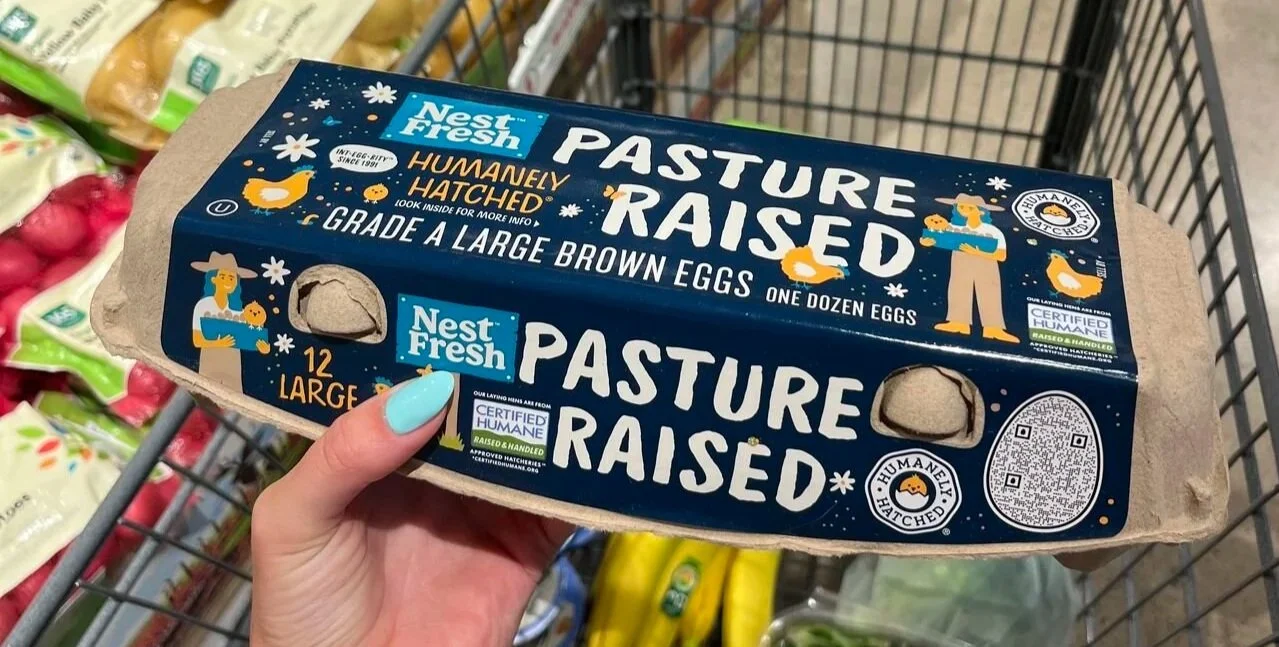In-Ovo Sexing Quarterly Roundup: Q3 2025
Welcome to Innovate Animal Ag's Q3 2025 in-ovo sexing roundup, where we dive into the latest news for the technology and what it means for consumers and producers. The third quarter of 2025 was an exciting period for in-ovo sexing, with several countries taking major steps in their adoption of the technology.
Business Roundup
In July, American egg producer NestFresh launched their Humanely Hatched product line, becoming the first producer in the United States to sell eggs from in-ovo sexed hens. These eggs can currently be found in Whole Foods across the country. “NestFresh didn’t just adopt this technology—we spearheaded the effort to bring it to market in the U.S.,” said Jasen Urena, executive VP of NestFresh. “Humanely Hatched represents years of collaboration, innovation, and commitment to doing what’s right. We’re honored to be the first to bring U.S. consumers eggs from hens humanely selected before hatch, verified by Certified Humane.” The Humanely Hatched product launch occurs as part of a larger trend of industry stakeholders paying increased attention to in-ovo sexing.
Innovate Animal Ag stumbled upon NestFresh’s Humanely Hatched eggs while shopping at our local Whole Foods
Agri Advanced Technologies announced it was installing a Cheggy machine in Brazil, marking the first in-ovo sexing machine to be installed in the southern hemisphere. The Cheggy machine will be installed at a Hy-line do Brasil hatchery and will be used by egg producer Raiar Orgânicos, a producer in the premium market that considers animal welfare core to its business. “Raiar is a restless company committed to the highest standards of transparency, management, and animal welfare. That’s why we actively seek out the best market practices and solutions to continuously improve animal welfare in egg production,” says Marcus Menoita, CEO and co-founder of Raiar. “The in-ovo sexing technology provided by Cheggy is the most effective, non-invasive, and viable solution available.” Previous research by IAA showed that 76% of Brazilian consumers would pay a premium for eggs made with in-ovo sexing.
Logo from Raiar Orgânicos: “Care from the beginning. Technology in favor of animal welfare”
In the same month, Kipster celebrated receiving its first flock of in-ovo sexed pullets. In a LinkedIn announcement the company shared that “the first eggs from these hens will hit the retail shelves by the end of 2025.” The chicks were processed at Hendrix Genetics’ Nebraska hatchery using Seleggt’s technology—the first U.S. facility equipped to in-ovo sex both white and brown eggs. Consumers eager to support this innovation can expect to find Kipster eggs with the Certified Humane® Approved Hatchery certification at Kroger and affiliated stores across 28 states, following the chicks’ maturation into laying hens.
In July, Vepymo, Het Anker, and Ab Ovo announced a partnership to jointly operate Vepymo’s newly renovated hatchery in Bad Bentheim, Germany. The hatchery, which opened last year with Orbem’s MRI-based in-ovo sexing technology, will now be shared by both companies. By combining their efforts, they plan to make better use of the space and supply larger flocks more efficiently to the German market. Despite the partnership, Vepymo and Het Anker will still sell chicks and hens separately under their own brands. This new agreement builds on their history of cooperation and will help them meet growing demand while keeping their costs manageable.
New Research
In September, Innovate Animal Ag released the results of our In-Ovo Sexing Australian Consumer Survey—the third survey we’ve conducted to better understand consumer attitudes toward the technology around the globe. The findings point to robust demand: Australian consumers reported a willingness to pay an average premium of A$0.93 (US$0.60) per dozen for eggs produced using in-ovo sexing. These results suggest a strong commercial opportunity for producers, indicating that early adopters of the technology will be well positioned to capture consumer loyalty and command premium pricing in a competitive market.
New IAA Programs
IAA announced several exciting new programs this quarter. In early September we launched our technology grants program, marking a major shift in how we’re supporting industry research. We will be awarding grants for transformative technologies with a strong business case. For us this is more than a simple grant disbursal; we will invest our time, expertise, and connections to give each of our grantees the best chance of scaling their ideas up and reaching commercial success. To kick off the program, we announced the award of a $100,000 grant to Dr. Adnan Alrubaye at the University of Arkansas. Dr. Alruyabe is conducting a study to develop an electron-beam inactivated vaccine for Bacterial chondronecrosis with osteomyelitis (BCO) lameness in broiler chickens. You can find more information about the program, including how to apply, on our grants page.
We also launched the IAA Poultry & Aquaculture Innovation Scholarship, an award for students from agricultural backgrounds who will drive the future of technological progress in the poultry and aquaculture sectors. The scholarship awards up to three students with $4,000 and career advancement opportunities within their respective sector. Applications are open from now until December 15th.
For more detailed information on in-ovo sexing technologies and their impact on the poultry industry, visit our In-Ovo Sexing Overview.



